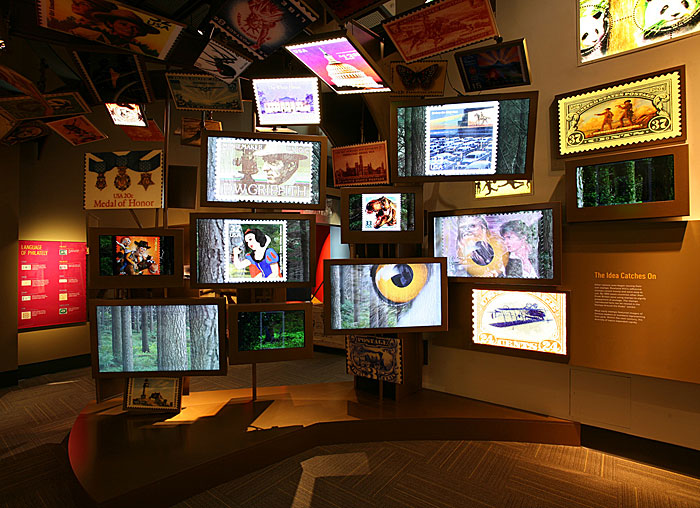World’s largest stamp gallery opens this month
Opening day packed with family-friendly events
Philatelists will be able to put their stamp of approval on the world’s largest gallery when the new William H. Gross Stamp Gallery opens at the National Postal Museum Sept. 22. Named after its primary benefactor, it is the only gallery to showcase postage stamps and mail in the context of American history and culture. It provides a fascinating experience available nowhere else and offers something for everyone—from casual visitors to experienced collectors.
Among the gems on display are: a cover postmarked on the moon in 1971; a watch worn by a clerk aboard the Titanic; one of only two 1868 1-cent Z-grill stamps in existence (with the image of Benjamin Franklin, the nation’s first postmaster general); a letter addressed to John Hancock postmarked July 4, 1776; stamps depicting kings of Hawaii before it became a state; and the icon of the Smithsonian’s stamp collection—the Inverted Jenny.
A wall of exterior windows overlooking Massachusetts Ave., in downtown Washington, D.C., depicts reproductions of 54 historic U.S. stamps, providing a dramatic nighttime glow and a preview of the museum’s 12,000 square feet of new exhibit space.
Special family activities, tours and programs will be offered throughout the day; from 10 a.m. until 5:30 p.m.:
- Make Your Own Stamp Collection—Visitors can select six free stamps from the museum’s bins of stamps from around the world to begin their own stamp collection, personalizing them according to favorite topics such as sports, animals, art or just about anything else.
- Stamp Design Contest—Every museum visitor can be a stamp designer. Family members can show off their artistic talents by designing their dream stamp and enter a chance to win the design-of-the-day contest. The first-place winner will receive a sheet of their stamps produced as real U.S. postage stamps.
- Special Meet-and-Greet with Bugs Bunny, Daffy Duck and Tweety—Kids will join Bugs, Daffy and Tweety in celebrating the grand opening of the new gallery. Previously featured on U.S. postage stamps, these Warner Bros. characters will be available to pose for pictures.
- U.S. Postal Service First-Day-of-Issue Ceremony—Nearly a century after it was first issued, America’s most famous stamp—the misprinted 24-cent Inverted Jenny—will be reprinted as a $2 stamp as part of the Stamp Collecting: Inverted Jenny souvenir stamp sheet being issued by the U.S. Postal Service at a 1 p.m. ceremony. The souvenir sheet features a new version of the most famous error in the history of U.S. stamps: a 1918 stamp that mistakenly showed a biplane flying upside down. Reprinted with a $2 denomination to make them easily distinguishable from the 24-cent originals, the Inverted Jennys on this sheet commemorate the many ways a single stamp can turn a moment in history upside down. Special first-day-of-issue cachets and special cancellations will be available at the event.
- Medal of Honor Enshrinement—The National Postal Museum will be accepting and enshrining a Medal of Honor into its collection as part of the grand-opening ceremony of the new gallery. The medal will be installed in the museum’s new National Stamp Salon exhibit. First Sgt. David McNerney (June 2, 1931–Oct. 10, 2010), an avid stamp collector, was awarded the Medal of Honor for his acts of bravery and valor during the Vietnam War. At 11 a.m., Gen. Ray Odierno, the 38th Chief of Staff of the U.S. Army, will present the Medal of Honor to Allen Kane, director of the National Postal Museum, on behalf of all who have served. Odierno and other dignitaries who knew of McNerney’s contributions will make remarks at this historic occasion. The 3rd U.S. Infantry Regiment, traditionally known as “The Old Guard”—the oldest active-duty infantry unit in the Army, serving the nation since 1784—will present the National Colors and the Medal of Honor flag for the ceremony.
- Correspondence Salon for Families—Send a special handmade card from the grand opening of the world’s largest stamp gallery. Pretty paper and whimsical ink stamps will be available to decorate cards and envelopes before they are mailed off to friends and loved ones. A stamp store, located within the museum, is making available a variety of stamps and a special William H. Gross Stamp Gallery postmark. Free postcards will also be available to visitors.
- Correspondence Salon for Ladies and Gentlemen—Visitors will be inspired at a series of 45-minute freestyle workshops offered throughout the day. The museum will provide materials, including vintage postage for the creation of artistic mail and envelopes certain to entertain, enchant and enlighten all who create or receive the exquisite creations. Visitors’ classic correspondence kits will include an array of envelopes, thick cards and other epistolary accessories. Each guest will also receive an assortment of stamps on one of many interesting topics.
- Meet Ben Franklin—Benjamin Franklin, the first postmaster general, would not miss the opening of the new gallery. He will be at the museum talking about his favorite objects on display. Visitors can pose in a photo with Ben and learn about his role in the history of the post.
- Scavenger Hunt—Visitors may take the scavenger hunt sheet to explore the museum and claim their prize after visiting all the stops indicated on the sheet and completing the tasks.
As visitors move through six thematic areas, stunning displays and interactive moments reveal the amazing stories that unfold from the museum’s unparalleled collection. Distributed throughout the thematic areas are hundreds of pullout frames containing more than 20,000 objects, providing ample opportunities to view noteworthy stamps that have never been on public display.
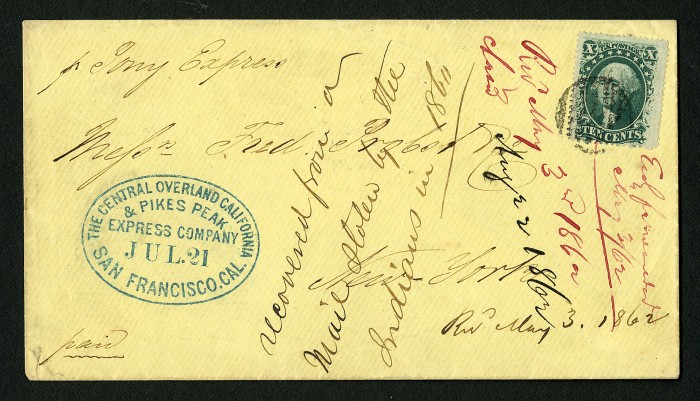
10c Washington on Pony Express cover, 1860. Loan from William H. Gross.
A Pony Express rider carried this cover, considered one of the most historically significant in U.S. postal history. Notice the notation on the front: “recovered from a mail stolen by the Indians in 1860.”
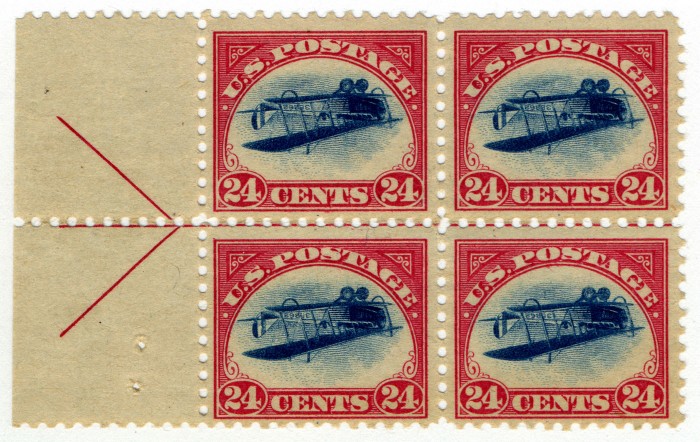
24c Curtiss Jenny inverted block of four, 1918. Loan from William H. Gross.
This upside-down blue plane within a red frame is the most famous U.S. stamp and one of the world’s most famous printing errors. Only one misprinted sheet of 100 stamps was sold.
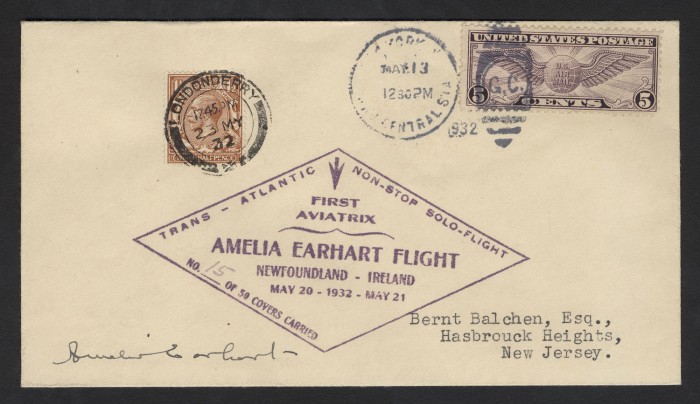
Amelia Earhart solo transatlantic flight cover, May 20, 1932.
On her historic solo flight across the Atlantic, Earhart carried 50 pieces of unofficial mail—each postmarked before and after landing, cacheted, numbered, and autographed to document the record-setting event.
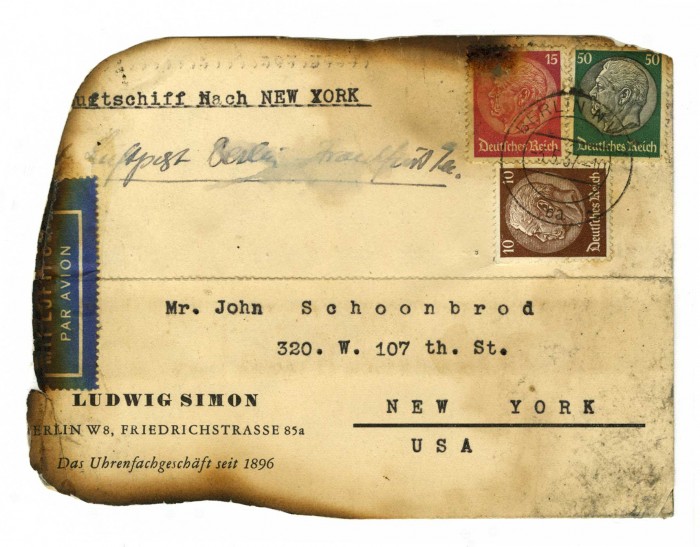
Hindenburg disaster card, May 6, 1937.
This piece of mail was salvaged from the wreckage of the airship Hindenburg. The burnt card reached its address in a glassine envelope with an official seal. At least 360 of the more than 17,000 pieces of mail on board the airship survived the disastrous fire.
Posted: 17 September 2013
- Categories:
